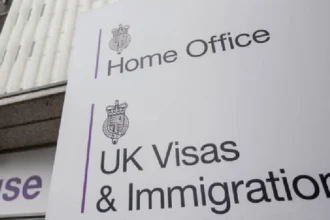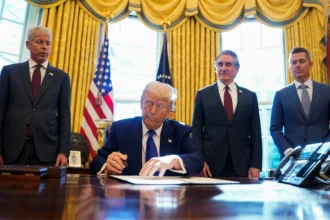
United Kingdom’s Conservative Party leader, Kemi Badenoch, has announced what she calls the “toughest immigration reforms in Britain’s history,” a sweeping initiative that promises to crack down on illegal migration, overhaul the country’s asylum system, and redefine the legal framework governing the nation’s borders.
In a strongly worded statement shared via a video message on her official X (formerly Twitter) account on Sunday, Badenoch declared that her government would take “uncompromising action” to restore control of Britain’s frontiers, which she said had been “surrendered to criminal gangs and bureaucratic weakness.”
“My message is clear: if you’re here illegally, you will be detained and deported,” she said firmly, as she unveiled her new immigration blueprint titled “The Radical Borders Plan.”
The announcement marks a pivotal moment in the UK’s ongoing debate over migration — an issue that has dominated British politics for more than a decade, influencing elections, Brexit negotiations, and domestic security policy.
Related posts:
- Soludo outlines conditions for release of detained Anambra native doctors
- Trump, Soyinka, Reagan, Márquez, and Clinton: When Nobel Laureates collide with American presidents
- President Donald Trump declares Nigeria a “Country of Particular Concern,” cites mass killings of Christians
- Trump Imposes New US Entry Restrictions, Nigeria Among 15 Countries Under Partial Ban
A New Era of Enforcement
At the centre of Badenoch’s proposal is the creation of a Removals Force, a new enforcement agency modelled after the U.S. Immigration and Customs Enforcement (ICE). The task force will be charged with identifying, detaining, and deporting illegal migrants at an unprecedented scale — up to 150,000 removals per year, according to the plan’s official outline.
The Removals Force will operate independently from existing immigration authorities and be empowered to execute deportation orders without lengthy bureaucratic delays. It will also coordinate with foreign governments to ensure swift repatriation of deportees, backed by new visa sanctions on countries that refuse to take back their citizens.
The plan promises to streamline deportation procedures, cutting the current multi-year appeals process down to a single week. Badenoch said this would eliminate what she called “the endless cycle of legal obstruction and activist litigation” that has stalled previous efforts to enforce immigration law.
Withdrawal from International Treaties
Among the plan’s most controversial components is a proposal to withdraw the United Kingdom from the European Convention on Human Rights (ECHR) — a move that would mark a major shift in the nation’s post-war legal framework. The ECHR, established in 1950, has long been cited by British courts in cases involving asylum seekers and deportations.
Badenoch argued that the convention has been “weaponised by left-wing lawyers and activist judges” to prevent the removal of individuals who have no legal right to remain in the country.
“We cannot allow foreign courts to override the will of the British people,” she declared. “Our democracy must not be held hostage by unelected judges in Strasbourg.”
To complement this withdrawal, the plan also calls for the repeal of the Human Rights Act, which incorporates the ECHR into UK law. In its place, a British Bill of Rights would be introduced to assert national sovereignty over issues of immigration and asylum.
Asylum System Overhaul
Badenoch’s plan also introduces sweeping restrictions on asylum eligibility. Under the proposed reforms, individuals entering the UK illegally — including those arriving across the English Channel in small boats — would be automatically disqualified from claiming asylum.
Instead, their cases would be processed through a new “safe third country” arrangement, enabling immediate deportation to countries such as Rwanda or others with which Britain may negotiate return agreements.
According to Badenoch, this approach would “end the perverse incentive for illegal entry” and restore integrity to the asylum process.
“We will no longer reward those who break the law with indefinite taxpayer-funded accommodation,” she said. “The era of asylum hotels and open borders is over.”
Criticism of Past Governments
Badenoch did not spare criticism for previous administrations, including both Conservative and Labour governments, accusing them of years of negligence and weak leadership on immigration.
She specifically targeted the Labour government’s record, citing what she described as “historic failures” that encouraged illegal migration and drained public resources.
“Successive governments have failed on immigration,” Badenoch said. “Labour promised to smash the gangs. Instead, in just one year, they delivered record small boat crossings — over 50,000 illegal arrivals, 32,000 people in asylum hotels, and billions wasted. It’s pure weakness.”
She also accused Labour of pursuing “performative compassion” that prioritised political optics over national security and economic stability.
The Conservative leader argued that her Radical Borders Plan would restore confidence among citizens who feel betrayed by decades of unmet promises.
Economic and Social Justifications
Badenoch defended the plan on both economic and moral grounds, claiming that uncontrolled immigration places unsustainable pressure on public services such as housing, healthcare, and education.
She noted that billions of pounds in taxpayer funds are currently spent each year on asylum seekers living in temporary accommodation, including thousands housed in hotels.
“We’re paying for illegal immigration twice — once in cash, and again in lost trust,” she said. “Every illegal migrant accommodated in a hotel means fewer resources for British families and communities in need.”
Badenoch’s message echoed her broader political philosophy: a blend of nationalism, fiscal discipline, and cultural conservatism that has defined her rise as the face of the modern Conservative movement.
Mixed Reactions to the Announcement
The announcement has drawn both praise and criticism across the political spectrum. Supporters within the Conservative Party hailed the plan as a “bold and necessary step” to regain control of the nation’s borders.
Right-leaning commentators described it as a decisive break from what they called “decades of political cowardice.” Some immigration enforcement advocates compared it to former U.S. President Donald Trump’s immigration crackdown, praising Badenoch’s willingness to challenge international norms.
However, opposition figures and human rights organisations condemned the proposal as draconian and potentially unlawful.
Labour Party officials accused Badenoch of “stoking fear and division” for political gain. Amnesty International and Human Rights Watch warned that withdrawing from the ECHR could isolate Britain diplomatically and undermine its global reputation as a defender of human rights.
The United Nations Refugee Agency (UNHCR) also expressed concern, saying that banning asylum claims from illegal entrants would violate the 1951 Refugee Convention, to which the UK remains a signatory.
Badenoch Stands Firm
Despite the backlash, Badenoch has stood by her plan, insisting that the majority of Britons support tougher border controls.
“The British people are tired of excuses,” she said. “They want action, not words. Only the Conservatives have a serious, credible plan to deliver stronger borders. If you come here illegally, you will be deported.”
Political analysts view the Radical Borders Plan as a defining moment for Badenoch’s leadership — and possibly a precursor to the next general election, where immigration is expected to be a dominant issue.
As the debate intensifies, one thing is clear: Badenoch’s hardline stance on immigration has placed her firmly at the centre of Britain’s political storm — a leader determined to reshape the country’s border policy, no matter how controversial the path ahead may be.






